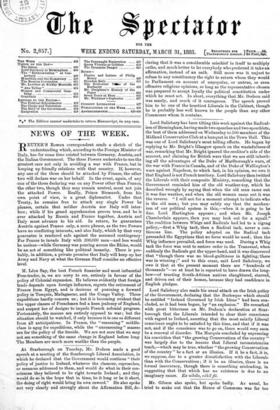Lord Salisbury has been tilting this week against the Radical-.
ism of Birmingham,having made two speeches and two speechlets, the best of them addressed on Wednesday to 500 members of the Midland Conservative Club at a banquet in the Town Hall. This was one of Lord Salisbury's most telling efforts. He began by replying to Mr. Bright's Glasgow speech on the wastefulness of war, remarking that Mr. Bright ignored the creditor's side of the account, and claiming for British wars that we are still inherit- ing all the advantages of the Duke of Marlborough's wars, of the war with France in Canada, and of the Duke of Wellington's wars against Napoleon, to which last, in his opinion, we owe it that England is not French territory. Lord Salisbury then twitted the Liberals with their composite Ministry, remarking that the Government reminded him of the old weather-toy, which he described wrongly by saying that when the old man came out it was fine weather, and when the old woman came out it was the reverse. "I will not for a moment attempt to indicate who is the old man ; but you may safely say that the mechan- ism of our political system is this,—when it is going to be fine, Lord Hartington appears ; and when Mr. Joseph Chamberlain appears, then you may look out for a squall." The coalition between Whigs and Radicals had led to a zigzag policy,—first a Whig tack, then a Radical tack, never a con- tinuous line. The policy adopted on the Radical tack persuaded the Egyptians that no force would be used; then the Whig influence prevailed, and force was used. During a Whig tack the force was sent to restore order in the Transvaal, when suddenly the Radicals got the upper-hand, and it was discovered that "though there was no blood-guiltiness in fighting, there was in winning ;" and to this craze, said Lord Salisbury, we owe- it that at the present moment there are "hundreds of thousands "—so at least he is reported to have drawn the long- bow—of trusting South-African natives slaughtered, starved, and driven out of their homes, because they had confidence in English pledges.


































